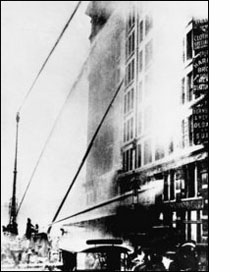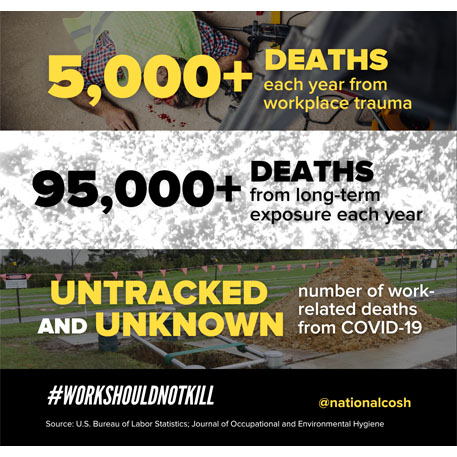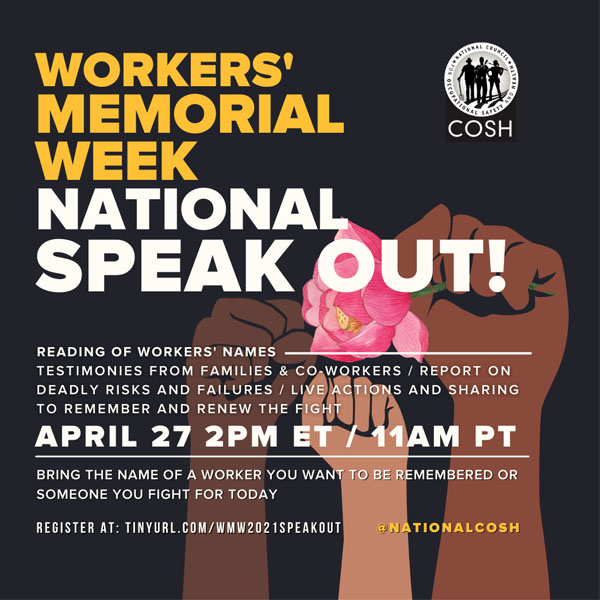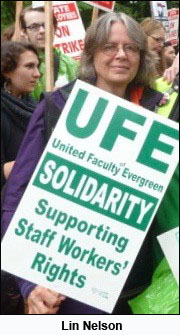OPINION
A needed remembrance, and rededication
Workers’ Memorial Week: Remembering, honoring and strengthening resolve in support of workplace safety and health
By LIN NELSON
(April 26, 2021) — Death, disability, disease — from hazards endured on the job. This is not a new issue. For a long time we’ve known that work can be hazardous, uneven in its impacts and challenging to respond to. Right now, in this COVID era, the workers’ health movement reminds us that workplace health and safety should not be a sideline, but a central issue for social justice and public health.
The roots of this problem goes way back… to the earliest mining and metals work, in agriculture and in industrial production.
 One event 110 years ago captured people’s attention. The Triangle Shirtwaist Fire in New York City on March 25, 1911. One hundred and forty people — mostly young immigrant women workers — died in this workplace apocalypse. Garment work back in the beginning of the last century was one of the dynamos of U.S. production and it depended on the availability of vulnerable workers, especially new immigrants. Fire hazard was a steady threat as they worked in cramped quarters, with limited paths to flee from the flames. This was compounded by a door kept locked so they owners could check their bags for any “pilfered goods.” One locked door can mean a lot to workers who are hoping to live another day; the locking of workplaces continues to this day as other fire dramas have consumed workers’ lives. The Remember The Triangle Fire Coalition calls on us to remember this vital, troubling history and link it to ongoing efforts to strengthen workers’ right-to-know and workers right-to-act.
One event 110 years ago captured people’s attention. The Triangle Shirtwaist Fire in New York City on March 25, 1911. One hundred and forty people — mostly young immigrant women workers — died in this workplace apocalypse. Garment work back in the beginning of the last century was one of the dynamos of U.S. production and it depended on the availability of vulnerable workers, especially new immigrants. Fire hazard was a steady threat as they worked in cramped quarters, with limited paths to flee from the flames. This was compounded by a door kept locked so they owners could check their bags for any “pilfered goods.” One locked door can mean a lot to workers who are hoping to live another day; the locking of workplaces continues to this day as other fire dramas have consumed workers’ lives. The Remember The Triangle Fire Coalition calls on us to remember this vital, troubling history and link it to ongoing efforts to strengthen workers’ right-to-know and workers right-to-act.
The United Nations Human Rights Commission has declared safe and healthy working conditions to be a fundamental human right, while pointing to the continuing violation of that right around the world, including in the United States. We know this right exists, but we still need to strategize how to bring attention to the hazards, how to make systemic responses have traction, and how to protect those who step out as whistleblowers.
 Right now, with all the damage done by the Trump administration on undermining labor, justice and health, there’s much build-back that needs to be done. The National Institute for Occupational Safety and Health (NIOSH), Occupational Safety and Health Administration (OSHA), and state labor and health departments have always had an uphill battle. They are operating in political zones where the “client that matters” is far more likely to be owners/managers than those working for a living.
Right now, with all the damage done by the Trump administration on undermining labor, justice and health, there’s much build-back that needs to be done. The National Institute for Occupational Safety and Health (NIOSH), Occupational Safety and Health Administration (OSHA), and state labor and health departments have always had an uphill battle. They are operating in political zones where the “client that matters” is far more likely to be owners/managers than those working for a living.
The launch of Workers’ Memorial Week — for the last week of April — is not only a needed remembrance, but a rededication to not only restore some of the original intent of protective public systems, but to build back stronger. This can only be done by building support for publicly understood and applied science, by sharing the evolving science in accessible ways, by supporting the exchange of knowledge, and by taking on the science-doubters like Tucker Carlson, among many.
Legendary labor leader Tony Mazzochi was a champion of building strong links between science, public health practice, labor and community. Those of us in the labor and public health movements need to continue in his footsteps — with a strong focus on movements — on-the-ground, in-the-streets actions that remind people of the hazards that are faced by their families, their neighbors and their communities.
 Labor advocates and community groups around the country are connecting with the National Council on Occupational Safety and Health to share information, organize events, and bring attention to this year’s deepened vulnerabilities, especially “essential workers” who have endured so much to protect the public. National COSH is collecting information on the workplace fatalities that can be directly linked to COVID. The workplace-COVID link must be publicly acknowledged so that we appreciate the work of industrial hygienists who are mapping the impacts of workplace exposure and design, so that we are vigilant about hazards and make sure that compensation gets delivered to workers and their families. On Tuesday, April 27, National COSH is hosting an online National Speak Out from 11 a.m. to 12:30 p.m. PT that will feature the stories of impacted workers and their families.
Labor advocates and community groups around the country are connecting with the National Council on Occupational Safety and Health to share information, organize events, and bring attention to this year’s deepened vulnerabilities, especially “essential workers” who have endured so much to protect the public. National COSH is collecting information on the workplace fatalities that can be directly linked to COVID. The workplace-COVID link must be publicly acknowledged so that we appreciate the work of industrial hygienists who are mapping the impacts of workplace exposure and design, so that we are vigilant about hazards and make sure that compensation gets delivered to workers and their families. On Tuesday, April 27, National COSH is hosting an online National Speak Out from 11 a.m. to 12:30 p.m. PT that will feature the stories of impacted workers and their families.
Here in Washington, remembrance was powerfully demonstrated in the fall when farm workers gathered to honor one of the workers lost to COVID: David Cruz.
Last week the Evergreen State College hosted its annual Farmworker Justice event, deepening knowledge of what has been endured in the fields and packing houses.
On April 13, the City of Olympia approved a proclamation commemorating the last week of April as “Workers Memorial Week.” We can hope that this week is the beginning of a renewed dedication to workers’ health and the health of communities.
 Lin Nelson is a retired college teacher renewing her ties to the worker safety and health movement.
Lin Nelson is a retired college teacher renewing her ties to the worker safety and health movement.





